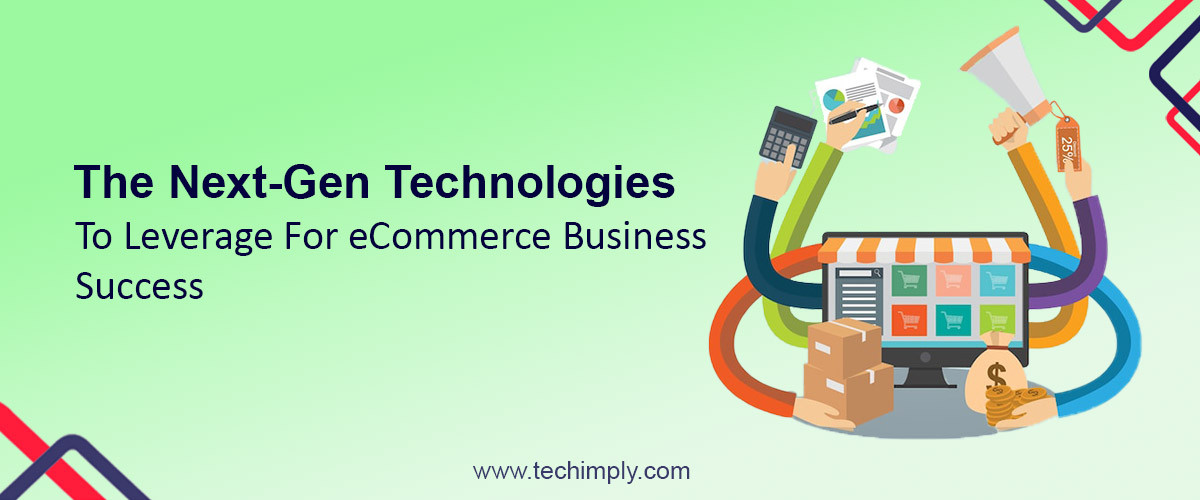Did you know that by 2026, a whopping 24% of retail purchases are expected to happen online? It’s because shoppers all across the globe love the convenience of browsing online and getting the product delivered to their doorstep.
But this impressive growth hasn’t slipped under the radar. Budding entrepreneurs are launching new eCommerce websites every day to grab a slice of this profitable pie.
Taking into account this situation, it’s imperative for your eCommerce business to embrace modern methods to streamline operations. So, here are the top 3 next-gen technologies that could be game-changers for your business.
Blockchain And Payment Security
As online shopping becomes more popular, there’s an inevitable need for secure payment methods. In fact, it’s a pressing concern for many customers. When they spend their hard-earned money online, they want to be sure it’s safe from prying eyes and potential fraudsters.
Fortunately, blockchain technology comes to the rescue here. Blockchain is like a digital ledger that’s impossible to tamper with. So, every financial transaction is recorded in a way that ensures both the buyer and seller are protected.
By integrating this technology into your eCommerce platform, your customers will feel confident about their purchases and trust your website. This will set your business apart and give you an edge in the competitive landscape.
Blockchain In ECommerce:
Blockchain is a distributed and decentralized digital ledger technology that can provide transparency, security, and immutability to various aspects of eCommerce
1. Transparency: Blockchain records all transactions in a transparent and tamper-proof manner. This can be particularly useful in eCommerce tools for tracking the origin of products, ensuring authenticity, and building trust with customers.
2. Supply Chain Management: Blockchain can be used to create a transparent supply chain where customers can track the journey of products from manufacturers to their doorsteps. This enhances accountability and reduces the risk of counterfeiting.
3. Smart Contracts: Smart contracts are self-executing contracts with predefined rules. In eCommerce, these contracts can automate various processes such as payment processing, order fulfillment, and returns, reducing human intervention and potential errors.
4. Payment Processing: Blockchain can streamline cross-border transactions by eliminating intermediaries and reducing transaction fees. This can be especially beneficial for international eCommerce.
5. Data Security: Customer data is sensitive and requires strong security. Blockchain's decentralized nature makes it harder for hackers to breach the system compared to traditional centralized databases.
Payment Security In ECommerce:
Ensuring secure payment processes is crucial to building customer trust and preventing fraud. Here's how you can leverage technology for payment security
1. Encryption: Implement strong encryption protocols for sensitive customer data such as credit card information. This ensures that even if data is intercepted, it remains unreadable.
2. Tokenization: Replace sensitive data with tokens that have no intrinsic value, making them useless for hackers even if intercepted.
3. Two-Factor Authentication (2FA): Implement 2FA for user accounts. This adds an extra layer of security by requiring users to provide two forms of identification before accessing their accounts.
4. Biometric Authentication: Leverage biometric data like fingerprints or facial recognition for user authentication. This makes it difficult for unauthorized users to gain access.
5. Fraud Detection Algorithms: Utilize machine learning algorithms to detect unusual patterns in transactions that might indicate fraudulent activities. These algorithms can learn from historical data and become more accurate over time.
6. Regular Security Audits: Conduct routine security audits of your payment infrastructure to identify vulnerabilities and address them promptly.
7. Secure Payment Gateways: Use reputable and secure payment gateways that comply with industry standards for security.
8. PCI DSS Compliance: Ensure that you are compliant with the Payment Card Industry Data Security Standard (PCI DSS), a set of security standards designed to ensure the protection of cardholder data.
Incorporating blockchain technology and robust payment security measures can significantly enhance the success of your eCommerce business by building trust, reducing fraud, and improving overall customer experience. However, it's important to keep in mind that technology is only one part of the equation – a comprehensive security strategy also requires employee training, user education, and ongoing vigilance against emerging threats.
Cutting-Edge Routing And Scheduling Software
As you already know, delivering products on time and efficiently is a cornerstone of eCommerce success. However, it’s definitely not an easy job.
Often, eCommerce sites sell goods that don’t need to be stored in a temperature-controlled environment. Or needs to ship products in small quantities. In such situations, ensuring packages get to customers faster and at a reduced cost becomes challenging.
Fortunately, many Dry Van Shipping providers nowadays use routing and scheduling software to make informed decisions. It helps them schedule pick-ups and drop-offs, reducing delays and boosting efficiency. So, you should consider working with such companies to improve the quality of your service.
Routing And Scheduling Software:
Advanced routing and scheduling software uses innovative technologies to optimize delivery routes, streamline logistics, and enhance customer satisfaction:
1. Artificial Intelligence (AI) And Machine Learning: These technologies analyze historical data, real-time traffic information, weather conditions, and other relevant factors to predict and recommend the most efficient routes for deliveries. Machine learning algorithms continually improve route suggestions based on new data inputs.
2. Real-Time Tracking: Integrating GPS, IoT devices, and time tracking software enables real-time tracking of delivery vehicles. This ensures customers receive precise updates on their package's location, estimated arrival time, enhancing transparency, and reducing uncertainty.
3. Dynamic Route Adjustments: Software can dynamically adjust routes in response to unexpected events, such as traffic congestion, accidents, or changes in order priorities. This ensures that deliveries are still made on time despite unforeseen circumstances.
4. Optimization Algorithms: Complex optimization algorithms help determine the best order in which to schedule deliveries, considering factors like delivery windows, vehicle capacities, and geographical proximity of stops.
5. Geofencing: Geofencing technology sets up virtual boundaries around specific locations. This can trigger notifications when a delivery vehicle enters or exits these boundaries, allowing for more accurate ETA predictions and automated customer notifications.
6. Predictive Analytics: By analyzing historical data and patterns, predictive analytics can forecast peak delivery times and demand fluctuations. This enables businesses to allocate resources effectively and ensure timely deliveries during high-demand periods.
7. Last-Mile Delivery Solutions: Technologies like drones and autonomous vehicles are being explored for last-mile delivery. These solutions can expedite delivery times and reduce human labor costs.
8. Integration With eCommerce Platforms: Seamless integration with eCommerce platforms and inventory management software ensures that order information flows smoothly into the routing and scheduling software, reducing manual data entry and minimizing errors.
9. Multi-Channel Communication: The software can facilitate communication between drivers, dispatchers, and customers through various channels, including mobile apps, SMS, and email. This helps manage expectations and resolve issues promptly.
10. Customizable Rules And Constraints: The software allows businesses to set specific rules and constraints for scheduling, such as delivery time windows, driver preferences, and vehicle capabilities.
11. Environmental Considerations: Some software solutions take into account environmental factors, such as fuel efficiency and emissions, to provide "greener" route options.
12. User-Friendly Interfaces: Intuitive interfaces for both dispatchers and drivers help streamline operations and reduce training time.
13. Address Verification: Address verification software plays a crucial role in e-commerce by ensuring accurate orders and satisfying customers. By integrating real-time validation with dependable databases, the occurrence of errors is minimized, leading to decreased shipping expenses. A more efficient verification process not only improves overall operational efficiency but also nurtures trust, thereby cultivating a strong online brand identity.
Implementing cutting-edge routing and scheduling software can lead to reduced delivery times, lower operational costs, improved resource utilization, and enhanced customer experiences in the eCommerce sector. However, businesses should carefully evaluate software options, considering factors like scalability, integration capabilities, and the specific needs of their operations.
AI-Powered Chatbots
1. Customers often find it pretty frustrating to hold during the call just to get the answer to a simple question. And this significantly influences their behavior and opinion towards the brands.
2. To avoid this situation, you can rely on AI-powered chatbots. By incorporating these artificial yet smart helpers live on your website, you can assist shoppers anytime and anywhere.
3. Shoppers can ask them anything, from “Where’s my order?” to “Do you have this shirt in blue?” Within seconds, they provide answers, saving customers time and reducing stress.
4. But it’s not just about quick responses. These chatbots also suggest products based on what shoppers are looking for. In short, they’re like friendly shop assistants, but online! It will eventually make your customers happier and smoother operations for businesses.
5. Not to forget, you can also save money, as you don’t need to employ anyone for full-time customer support. AI can do it all with ease.
Conclusion
In the ever-evolving landscape of eCommerce, leveraging next-gen technologies is essential for sustainable success. Innovations like AI-powered personalization, augmented reality shopping experiences, blockchain for secure transactions, and IoT-driven supply chain optimization offer unprecedented opportunities. By embracing these technologies, eCommerce businesses can stay competitive, enhance customer experiences, and build a future-proof foundation for continued growth and prosperity in the digital marketplace.






